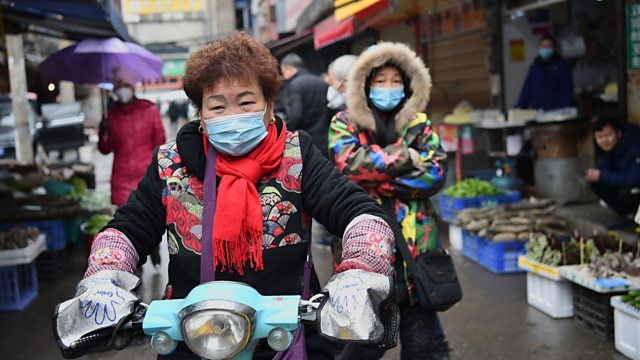How China's coping with coronavirus
Getting to the heart of the coronavirus outbreak in Hubei province. Plus: Brumadinho rebuilds, morale in Afghanistan's armed forces; Poland and Russia argue over the facts of WWII
As cases of coronavirus are found across continents, the world is ever more preoccupied with where the new variant first came from - and how best to stop it spreading. Travelling in to Hubei province, Stephen McDonnell found the Chinese authorities even keener on news management than usual, and perhaps giving it higher priority than infection control. He's now back from Wuhan - and confined to his home in Beijing for a fortnight in quarantine.
Pascale Harter introduces this and other stories from reporters and writers around the world.
Just over a year ago, Brazil suffered an ecological disaster - not the fires in the Amazon rainforest, but the collapse of huge dam holding toxic mining waste near the city of Brumadinho. 270 people were killed and a wide swathe of land poisoned by the overspill. Katy Watson reported on the immediate aftermath, and has been back to see how the place is coping a year later. It turns out that Brumadinho has undergone an unexpected mini-economic boom - but the trauma still lingers.
Nanna Muus Steffensen has talked to many an Afghan Army recruit or police officer - and heard all too many stories of their fears and their grief. Nearly all have lost colleagues and loved ones to the country's cycles of political violence. The US and the Taliban may be inching towards some sort of accord at the negotiating table, but these young men and women are still facing lethal risks every day. After so long at arms, some are starting to ask what they're really fighting for.
The recent commemorations held at the site of the Nazi labour camp and extermination centre at Auschwitz received plenty of news coverage. 75 years after the inmates were liberated by Soviet troops, the world recognises what happened there during the Holocaust and often promises such genocide could never happen again. But there's less agreement over the role which Polish citizens - and the Polish nation - played during World War II, and as Adam Easton explains from Warsaw, there have been some bitter diplomatic disputes over who gets to be the judge of history.
Photo: A woman wearing a facemask to help stop the spread of a deadly virus rides through a market in Wuhan on January 24, 2020. (HECTOR RETAMAL / AFP)
Last on
More episodes
Previous
Next
Broadcasts
- Sat 1 Feb 2020 23:06GMT成人快手 World Service
- Sun 2 Feb 2020 04:06GMT成人快手 World Service
- Sun 2 Feb 2020 09:06GMT成人快手 World Service
- Sun 2 Feb 2020 17:06GMT成人快手 World Service News Internet

